The DA is more efficient at Twitter spin than at delivering basic services to Khayelitsha

I work every day in Khayelitsha. From time to time I am there at night, usually to drop somebody at home after a meeting or social event. In the daytime I am as good as any taxi driver at avoiding the potholes that litter the streets. At nights it’s not so simple.
There are no streetlights in major sections of Khayelitsha, including the main road, Lansdowne Road. I wait for that pothole jolt and wince at the vehicle damage which might only emerge in years to come. I stare intently ahead, anxious that a child whose shack home borders the street may wander in front of me. For me the lack of streetlights means money and inconvenience. For the residents of Khayelitsha walking home it means constant exposure to danger and crime.
One night in Khayelitsha, with no other immediate outlet for the years of frustration, I tweeted the problem at Premier Helen Zille and Mayor Patricia de Lille. It was July last year. We’ve all seen Zille responding briskly to a burst water pipe in Bellville, a collapsed tree in Pinelands, or a pothole in the suburbs. She often appears to be sorting out the province’s problems with nothing more than the Twitter app on her Blackberry. I was sure that the streetlights on the main road in a township of nearly a million people would rank as a Twitter priority.
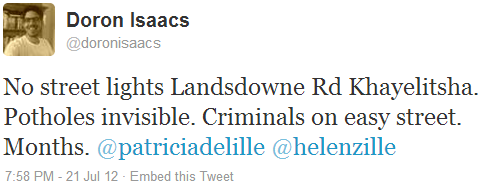
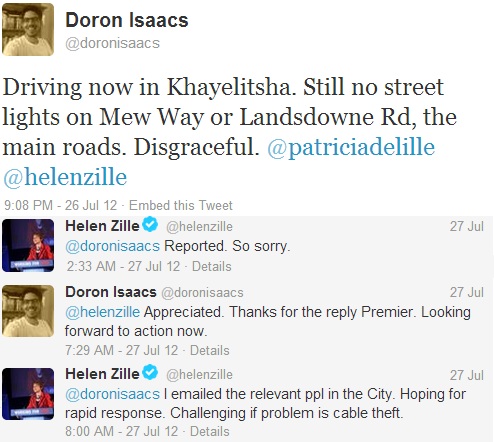
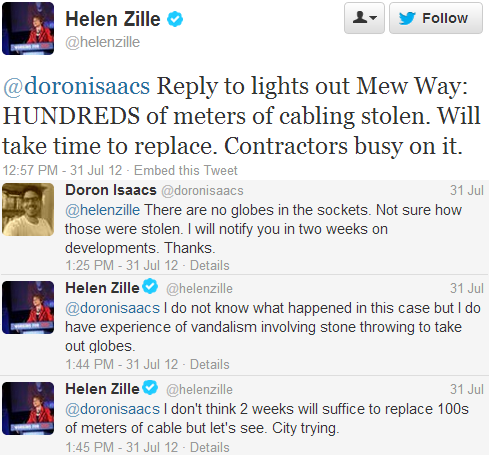
By the end of July Premier Zille adopted her primary justification: criminals (or perhaps residents) had stolen the electricity cables, and destroyed the lights with stones. I knew this explanation was, on some level, plausible, but it seemed convenient and symptomatic of a mentality that blames the poor for their problems. Nevertheless, the Premier had said that the contractors were busy solving the problem and I decided to give her the benefit of the doubt.
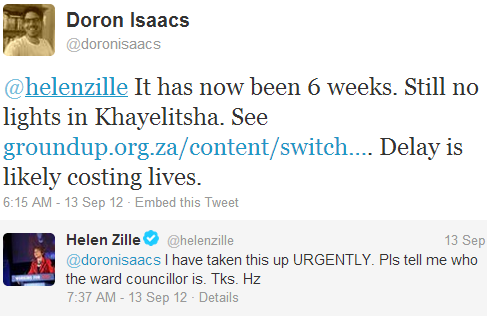
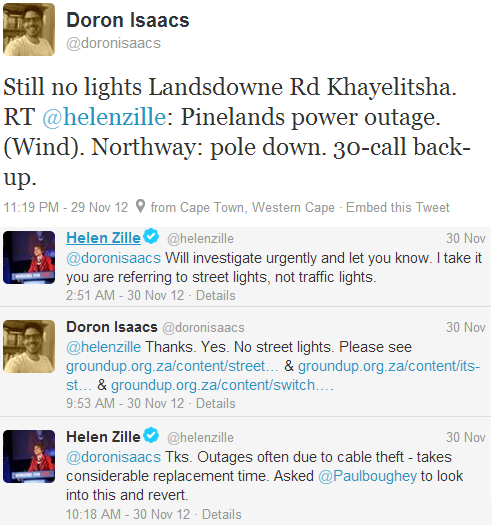
In late November, when I saw Zille rallying to the Pinelands power outage I decided to remind her of the small problem of kilometers of main roads with no street lights in Khayelitsha. She seemed to have forgotten our previous correspondence, but soon reverted to the cable theft explanation. The links that I sent her were to a news article on the Khayelitsha lights problem, a follow-up article, and an editorial, all from the GroundUp website.
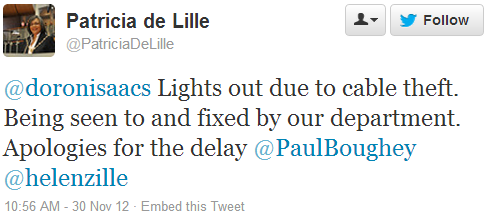
Last night I drove the full length of Landsdowne Road to assess the situation. After more than six months of requests by me, and promises by the Premier and Mayor, it appears to have worsened.
This was the map of the streetlight situation in September last year published as part of the GroundUp editorial:
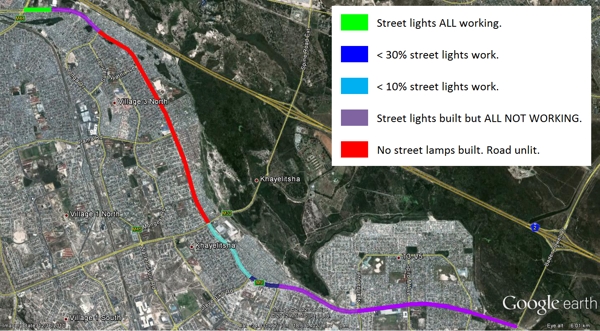
At present there is no longer any section where all the lights work. The lights that were working at the corner of Landsdowne and Mew Way Roads, the principal intersection of the township (green on the map), no longer work. In fact, on the 8.5km stretch from Baden Powell Drive heading west on Landsdowne there are only eleven working street lights. For the residents of Khayelitsha this is equivalent to there being just eleven working streetlights on Main Road or Beach Road all the way from town, through Sea Point, Bantry Bay, Clifton and Camps Bay beach.
It is clear that there has been no work done on the lights on Landsdowne Road in Khayelitsha. It is now six months since the Premier first responded to me and indicated that she was “hoping for a rapid response”. Try to imagine for a moment if there were no street lights for more than a year in Kloof Street, or Rhodes Drive in Newlands. It is simply inconceivable that, despite repeated promises, the inconvenience and danger to residents in such middle-class areas would be deprioritised in quite the same way.
I am quite happy to give the Premier and the Democratic Alliance credit when it is due. During these six months of growing frustration and anger I have used Twitter to praise the Premier for the new Khayelitsha hospital and for setting up the Commission of Inquiry into Khayelitsha Police.
I also don’t rely exclusively on Twitter. (Two months ago I wrote to a DA member of the City Council about the Khayelitsha streetlights in the hope that he could be of assistance.) But if the Premier is going to use Twitter to seem accessible and accountable, and to give firm assurances, then she must make good on those assurances.
Doron Isaacs is Deputy General Secretary of Equal Education. Follow him on Twitter @doronisaacs.
Support independent journalism
Donate using Payfast

Don't miss out on the latest news
We respect your privacy, and promise we won't spam you.

This article is licensed under a Creative Commons Attribution-NoDerivatives 4.0 International License.
